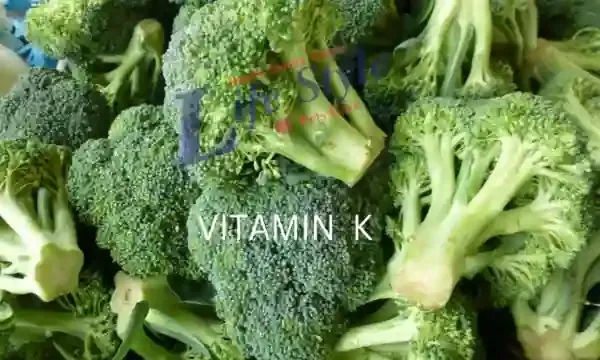What is vitamin K
Vitamin K is a fat-soluble vitamin, which is also known as the coagulation vitamin, as it plays a key role in the process of blood clotting and preventing bleeding.
Types of vitamin K
There are three types of vitamin K:
Vitamin K1 is called phylloquinone and is found naturally in fruits and vegetables, especially green vegetables.
Vitamin K2: it is called menaquinone, which is found in fermented foods such as fermented soybeans, and foods of animal origin, such as meat, eggs, and cheeses.
Vitamin K3: called menadione, is an unnatural type of vitamin K, which is not intended for human use.
Essential vitamin K1 is used in dietary supplements.
The benefits of vitamin K for the body
One of the most important benefits of vitamin K for the body is that:
Essential for the blood coagulation process necessary to stop bleeding when wounds are infected, it is necessary for the formation of prothrombin in the liver.
It plays an important role in the formation and maintenance of bone health.
Essential for heart health.
Vitamin K can be used for:
Prevention of bleeding, it is also given as an antitoxic treatment with anticoagulant drugs such as warfarin.
Treatment or prevention of osteoporosis.
Improve memory.
It is lowering blood pressure.
Prevention of heart disease and stroke.
Prevention of cancer.
Maintaining dental health.
Vitamin K for babies
In some babies who did not get enough vitamin K during pregnancy, blood will lose the ability to coagulate and heal wounds, which leads to serious complications after birth, so these babies are injected after birth with this vitamin to prevent bleeding.
Daily vitamin K dosage
The daily doses of vitamin K vary depending on the age of the individual, which is as follows:
Infants 0 - 6 months: 2.0 MCG.
Infants 7 - 12 months: 2.5 MCG.
Children 1-3 years: 30 mcg.
Children 4-8 years: 55 MCG.
Children 9-13 years: 60 mcg.
Adolescents 14-18 years: 75 mcg.
Adult men: 120 micrograms.
Women, including pregnant and lactating: 90 mcg.
Sources of vitamin K in food
The most important sources of vitamin K from foods include:
Salads and green plants, such as spinach, lettuce, and broccoli.
Carrots.
Dairy products such as cheese, and milk.
Eggs.
Meat and fish.
Legumes, including soybeans.
Pine nuts and cashews.
Pumpkins.
Olive oil.
Fruits do not usually contain as large amounts of vitamin K as green leafy vegetables, but few of them can provide acceptable amounts of it. The most important fruits rich in vitamin K include:
Strawberries.
Cranberries.
Pomegranate.
Grapes.
Fig.
Vitamin K can also be obtained by taking dietary supplements containing vitamin K1 or vitamin K2.
Lack of vitamin K
Vitamin K deficiency is rare because the normal microflora in the intestine produces it in sufficient quantities. Still, there may be a decrease in its levels due to taking antibiotics that kill these bacteria, or due to the presence of diseases in the intestine and digestive systems such as Crohn's disease, or excessive alcohol intake.
One of the main symptoms of vitamin K deficiency is frequent bleeding and the appearance of bruises under the skin.
Tips when taking vitamin K
There is no harm to vitamin K, and the most important tips when taking vitamin K can include the following:
Vitamin K is best obtained from healthy foods rather than supplements.
Newborns need a larger amount of vitamin K.
It is advisable not to overdo vitamin K supplements and take them under the supervision of a doctor.
You should consult your doctor before taking vitamin K and foods rich in it if the patient is taking some types of medications, including blood thinners, antibiotics, epilepsy medications, cancer medications, and others.
When taking anticoagulants, such as warfarin, it is advisable to monitor the intake of vitamin K, and not to change the amount of intake from natural sources rich in it, as:
In the case of a diet with a high content of vitamin K and then abruptly stopping it, then the person will be exposed to an increased risk of bleeding.
If you follow a diet that contains a small percentage of vitamin K and then go to take large amounts of vitamin K, then the risk of blood clots is great.

